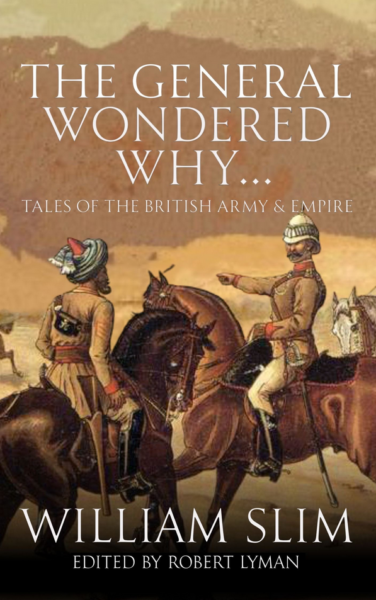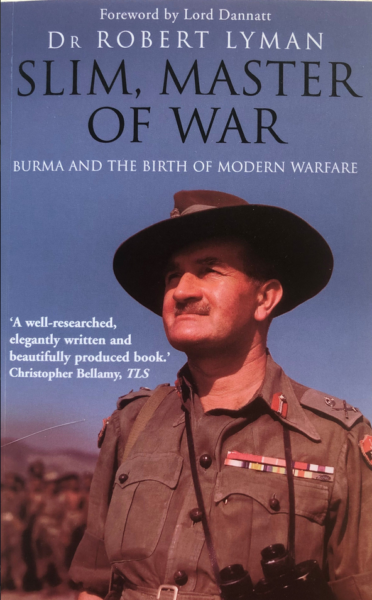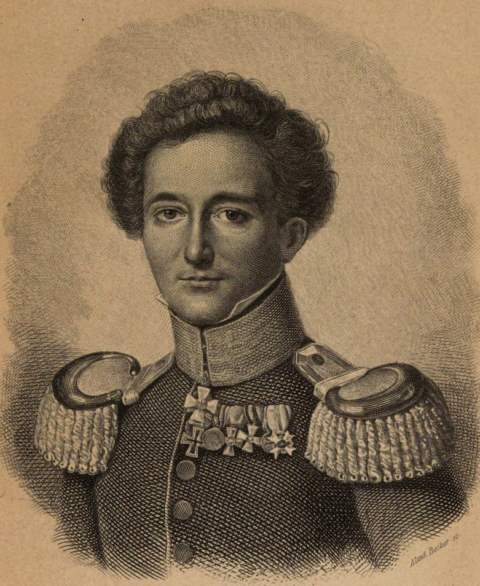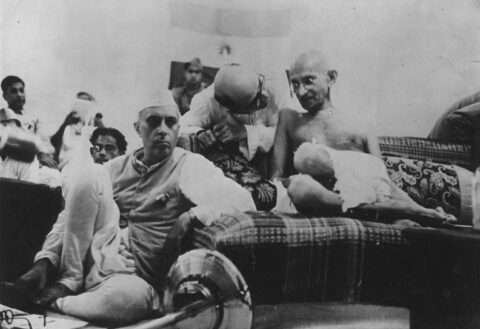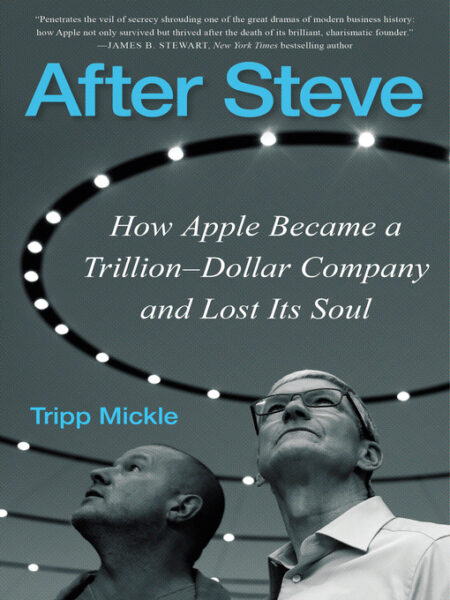Nebulous Media
Published 6 Dec 2022Jean Yarbrough joins Douglas Murray on this episode to discuss Thomas Jefferson’s life and legacy. They talk about the Declaration of Independence, his presidency, and the various controversies that have surrounded him. Should Thomas Jefferson stay cancelled?
(more…)
May 9, 2023
Uncancelled History with Douglas Murray | EP. 03 Thomas Jefferson
April 28, 2023
Field Marshal Slim’s secret vice – he also wrote articles and short stories under pseudonym
It’s no secret that I have a very high regard for Field Marshal William Slim, so I’m quite looking forward to reading some of Slim’s pre-WW2 writings that have just been gathered together by Dr. Robert Lyman in a three-volume set:
Few people during his lifetime, and even fewer now, know that the man who was to become one of the greatest British generals of all time – and I’m not exaggerating – was in fact a secret scribbler. Now, many people know that he was the author of at least two best selling books. In 1956 he wrote his account of the Burma campaign, Defeat into Victory, described by one reviewer, quite rightly in my view, as “the best general’s book of World War II”. Then, in 1959, he published, under the title of Unofficial History, a series of articles about his military experience, some of which had been published previously as articles in Blackwood’s magazine. This was the first indication that there was an unknown literary side to Slim. The fact that he was a secret scribbler, or at least had been one once, was only publicly revealed on the publication of his biography in 1976 by Ronald Lewin – Slim, The Standard Bearer – which incidentally won the W.H. Smith Literary Award that same year. Lewin explained that Slim had written material for publication long before the war. In fact, between 1931 and 1940 he wrote a total of 44 articles, extending in length between two and eight thousand words – a total of 122,000 words in all – for a range of newspapers and magazines, including Blackwood’s Magazine, the Daily Mail, the Evening Express and the Illustrated Weekly of India. According to Lewin, he did this to supplement his earnings as an officer of the Indian Army. He didn’t do it to create a name for himself as a writer, or because he had pretensions to the artistic life, but because he needed the money. As with all other officers at the time who did not have the benefit of what was described euphemistically as “private means” he struggled to live off his army salary, especially to pay school fees for his children, John (born 1927) and Una (born 1930). Accordingly, he turned his hand to writing articles under a pseudonym, mainly of Anthony Mills (Mills being Slim spelt backwards) and, in one instance, that of Judy O’Grady.
With the war over, and senior military rank attained, he never again penned stories of this kind for publication. With it died any common remembrance of his pre-war literary activities. Copies of the articles have languished ever since amidst his papers in the Churchill Archives Centre at the University of Cambridge, from where I rescued them last year. They have been republished this week by Richard Foreman of Sharpe Books.
During the time Slim was writing these the pseudonym protected him from the gaze of those in the military who might believe that serious soldiers didn’t write fiction, and certainly not for public consumption via the newspapers. He certainly went to some lengths to ensure that his military friends and colleagues did not know of this unusual extra-curricular activity. In a letter to Mr S. Jepson, editor of the Illustrated Times of India on 26 July 1939 (he was then Commanding Officer of 2/7 Gurkha Rifles in Shillong, Assam) he warned that he needed to use an additional pseudonym to the one he normally used, because that – Anthony Mills – would then be immediately “known to several people and I do not wish them to identify me also as the writer of certain articles in Blackwood’s and Home newspapers. I am supposed to be a serious soldier and I’m afraid Anthony Mills isn’t.”
What do these 44 articles tell us of Slim? He would never have pretended that his writings represented any higher form of literary art. He certainly had no pretensions to a life as a writer. He was, first and foremost, a soldier. His writing was to supplement the family’s income. But, as readers will attest, he was very good at it. They demonstrate his supreme ability with words. As Defeat into Victory was to demonstrate, he was a master of the telling phrase every bit as much as he was a master of the battlefield. He made words work. They were used simply, sparingly, directly. Nothing was wasted; all achieved their purpose.
The articles also show Slim’s propensity for storytelling. Each story has a purpose. Some were simply to provide a picture of some of the characters in his Gurkha battalion, some to tell the story of a battle or of an incident while on military operations. Some are funny, some not. Some are of an entirely different kind, and have no military context whatsoever. These are often short adventure stories, while some can best be described as morality tales. A couple of them warned his readers not to jump to conclusions about a person’s character. Some showed a romantic tendency to his nature.
The stories can be placed into three broad categories. The first comprises seventeen stories about the Indian Army, of which the Gurkha regiments formed an important part. The second group are eleven stories about India, with no or only a passing military reference. The third, much smaller group, contains seventeen stories with no Indian or military dimension.
April 9, 2023
Uncancelled History | EP. 01 Robert E. Lee
Nebulous Media
Published 21 Nov 2022Jonathan Horn joins Douglas Murray on this episode to discuss Robert E. Lee’s infamous legacy. The two dissect his childhood, military career and life after the war. Should Robert E. Lee stay cancelled?
(more…)
April 8, 2023
The underlying philosophy of J.R.R. Tolkien’s work
David Friedman happened upon an article he wrote 45 years ago on the works of J.R.R. Tolkien:
The success of J.R.R. Tolkien is a puzzle, for it is difficult to imagine a less contemporary writer. He was a Catholic, a conservative, and a scholar in a field-philology-that many of his readers had never heard of. The Lord of the Rings fitted no familiar category; its success virtually created the field of “adult fantasy”. Yet it sold millions of copies and there are tens, perhaps hundreds, of thousands of readers who find Middle Earth a more important part of their internal landscape than any other creation of human art, who know the pages of The Lord of the Rings the way some Christians know the Bible.
Humphrey Carpenter’s recent Tolkien: A Biography, published by Houghton Mifflin, is a careful study of Tolkien’s life, including such parts of his internal life as are accessible to the biographer. His admirers will find it well worth reading. We learn details, for instance, of Tolkien’s intense, even sensual love for language; by the time he entered Oxford, he knew not only French, German, Latin, and Greek, but Anglo-Saxon, Gothic and Old Norse. He began inventing languages for the sheer pleasure of it and when he found that a language requires a history and a people to speak it he began inventing them too. The language was Quenya, the people were the elves. And we learn, too, some of the sources of his intense pessimism, of his feeling that the struggle against evil is desperate and almost hopeless and all victories at best temporary.
Carpenter makes no attempt to explain his subject’s popularity but he provides a few clues, the most interesting of which is Tolkien’s statement of regret that the English had no mythology of their own and that at one time he had hoped to create one for them, a sort of English Kalevala. That attempt became The Silmarillion, which was finally published three years after the author’s death; its enormous sales confirm Tolkien’s continuing popularity. One of the offshoots of The Silmarillion was The Lord of the Rings.
What is the hunger that Tolkien satisfies? George Orwell described the loss of religious belief as the amputation of the soul and suggested that the operation, while necessary, had turned out to be more than a simple surgical job. That comes close to the point, yet the hunger is not precisely for religion, although it is for something religion can provide. It is the hunger for a moral universe, a universe where, whether or not God exists, whether or not good triumphs over evil, good and evil are categories that make sense, that mean something. To the fundamental moral question “why should I do (or not do) something”, two sorts of answers can be given. One answer is “the reason you feel you should do this thing is because your society has trained you (or your genes compel you) to feel that way”. But that answers the wrong question. I do not want to know why I feel that I should do something; I want to know why (and whether) I should do it. Without an answer to that second question all action is meaningless. The intellectual synthesis in which most of us have been reared — liberalism, humanism, whatever one may call it — answers only the first question. It may perhaps give the right answer but it is the wrong question.
The Lord Of The Rings is a work of art, not a philosophical treatise; it offers, not a moral argument, but a world in which good and evil have a place, a world whose pattern affirms the existence of answers to that second question, answers that readers, like the inhabitants of that world, understand and accept. It satisfies the hunger for a moral pattern so successfully that the created world seems to many more real, more right, than the world about them.
Does this mean, as Tolkien’s detractors have often said, that everything in his books is black and white? If so, then a great deal of literature, including all of Shakespeare, is black and white. Nobody in Hamlet doubts that poisoning your brother in order to steal his wife and throne is bad, not merely imprudent or antisocial. But the existence of black and white does not deny the existence of intermediate shades; gray can be created only if black and white exist to be mixed. Good and evil exist in Tolkien’s work but his characters are no more purely good or purely evil than are Shakespeare’s.
March 26, 2023
QotD: Bing Crosby meets the modern jazz musicians
The story involves Bing Crosby in the final years of his life. He was invited to sing at an event, probably for a charity or cause, and the host enlisted some young progressive jazz musicians to accompany the famous singer. The band members weren’t impressed by this aging star, who had made his reputation back in the 1920s, and decided to throw Crosby off his game.
When Bing showed up, he greeted them in his typical laidback manner, and told them he would sing some familiar old songs. But when the performance started, these young jazz players threw in every arcane substitute chord change and rhythmic displacement they could think of, further spicing up their accompaniment with Coltrane modal fills and bits of polytonality.
Much to their frustration, nothing they did that evening disrupted Bing in the least. This old, balding pop singer navigated effortlessly through every one of their advanced harmonies, never faltering or showing the slightest degree of discomfort. Even more infuriating, Bing maintained the relaxed and unflappable delivery that was a Crosby trademark. As far as the audience could tell, he was just as happy-go-lucky as ever, and maybe he was — after all, Crosby had learned the ropes as a young man alongside Bix Beiderbecke, who was as unconventional and unpredictable as any musician from the early 20th century.
When the performance was all done, the musicians expected to get chewed out by Crosby backstage. Instead, Bing shook their hands, and thanked them with great warmth. He said how “cool it was to play with these young cats,” and expressed his sincere desire that they might do so again in the future.
Ted Gioia, “Four Perspectives on Bing Crosby”, The Honest Broker, 2022-12-23.
March 22, 2023
What happened to Colour Sergeant Frank Bourne after Rorke’s Drift?
The History Chap
Published 20 Jul 2022Colour Sergeant Frank Bourne was the senior NCO at the Battle of Rorke’s Drift during the Zulu War of 1879. Superbly played by actor Nigel Green in the 1964 film Zulu, many have wondered why he was never awarded a Victoria Cross when 11 others were. This is the story of what happened to Colour Sergeant Frank Bourne after Rorke’s Drift.
He was actually awarded Britain’s second highest military medal (at the time), the Distinguished Conduct Medal, and ultimately rose from the ranks to become an officer. His military career continued all the way to the First World War, where he was promoted to the rank of Lt. Colonel. Frank Bourne, the last surviving defender of Rorke’s Drift, died in 1945, one day after the Germans surrendered.
(more…)
March 20, 2023
QotD: The world of “Plum”
“It was a confusion of ideas between him and one of the lions he was hunting in Kenya, that caused A. B. Spottsworth to make the obituary column. He thought the lion was dead, and the lion thought it wasn’t.” The author of these lines, P.G. Wodehouse, understood a thing or two about humour. Written seventy years ago, his wit sparkles on, undimmed.
The maestro also knew a thing or two about politics. This is strange, for few of his nearly one hundred novels, short stories or plays betray more than a nodding acquaintanceship with the great upheavals of the 20th century. Enquiring deeper, the connoisseur will find that his eternal creation, Jeeves — the discreet, silent, valet-cum-butler extraordinaire — was named in honour of a popular English cricketer who died on the Somme in 1916. The subject himself, in a post-1945 volume, admitted to his employer Bertie Wooster that he had “dabbled somewhat in the Commandos” during the Second World Conflagration.
War and turmoil are there, lurking in the background, if successfully banished from much of his writing. Sadly, Pelham Grenville (forenames he hated, so adopted the moniker “Plum” instead) was naïve. Loafing professionally in France when the Wehrmacht knocked on his door for tea and crumpets in 1940, he and his wife were interned as enemy aliens. In 1941, Plum agreed to record five broadcasts to the USA, then neutral. Entitled How to be an Internee without previous Training, they comprised playful anecdotes about his experiences as a prisoner of the folk in field grey. I’ve read them. They are rib-tickling and harmless, and his American readers lapped them up. Alas, his British fan club took a different view.
The devotees of Bertie Wooster, Reginald Jeeves, the Earl of Emsworth, Sir Roderick Glossop and Co. were at first stunned, then vexed and finally branded the poor author a traitor. Although a post-war MI5 investigation exonerated him, a hurt Wodehouse thereafter lived in exile on Long Island. Fortunately for us, the flow of humour continued unabated, but Plum’s hard-earned Knighthood for conjuring up the essence of Bottled Englishness was long delayed until the New Year’s Honours of 1975. He died soon after, on St Valentine’s Day, aged ninety-three.
This lapse of judgement was all the more extraordinary given his ability to spot a scoundrel at one hundred paces. Threats to the serene, ordered nature of English society in which he resided — indeed helped to create — were few. In Wodehouse’s Garden of Eden, there is a definite hierarchy of earls and aunts, bishops, baronets and young blades, stationmasters and policemen.
The majority of his tales are set in country houses, replete with conservatories, libraries, gun rooms, stables and butler’s pantries. Letters arrive by several posts a day, telegrams by the hour. Trains run on time from village stations. Other than the pinching of policemens’ helmets, there is order and serenity. Necklaces are filched, silverware is purloined, butlers snaffle port, chums are impersonated, romances develop in rose gardens, but nothing lurks to fundamentally reorder society.
Peter Caddick-Adams, “Coups and coronets”, The Critic, 2022-12-13.
March 16, 2023
Field Marshal Slim’s one and only demotion … from lance-corporal back down to private
William Slim, arguably the best British general of the Second World War, didn’t have the fastest start to his military career, as recounted in an article by Frank Owen, the editor of the WW2 South East Asia theatre publication Phoenix. This and many others appear in Dr. Robert Lyman’s upcoming book Slim, Master of War:
The General stood on an ammunition box. Facing him in a green amphitheatre of the low hills that ring the Palel Plain, sat or squatted the British officers and sergeants of the 11th East African Division. They were then new to the Burma Front and were moving into the line the next day. The General removed his battered slouch hat, which the Gurkhas wear and which has become the headgear of the 14th Army. “Take a good look at my mug”, he advised. “Not that I consider it to be an oil painting. But I am the Army Commander and you had better be able to recognize me — if only to say “Look out, the old b…. is coming round”.
Lieutenant-General Sir William Slim, KCB, CB, DSO, MC (“Bill”) is 53, burly, grey and going a bit bald. His mug is large and weather beaten, with a broad nose, jutting jaw, and twinkling hazel eyes. He looks like a well-to-do West Country farmer, and could be one. For he has energy and patience and, above all, the man has common sense. However, so far Slim has not farmed. He started life as a junior clerk, once he was a school teacher, and then he became the foreman of a testing gang in a Midland engineering works. For the next 30 years Slim was a soldier.
He began at the bottom of the ladder as a Territorial private. August 4, 1914, found him at Summer camp with his regiment. The Territorials were at once embodied in the Regular Army, and Slim got his first stripe as lance-corporal. A few weeks later he was a private again, the only demotion that this Lieutenant-General has suffered.
It was a sweltering, dusty day and the regiment plodded on its twenty-mile route march down an endless Yorkshire lane. At that time British troops still marched in fours, so that Lance-Corporal Slim, as he swung along by the side of his men, made the fifth in the file, which brought him very close to the roadside. There were cottages there and an old lady stood at the garden gate.
“I can see her yet”, Slim reminisces. “she was a beautiful old lady with her hair neatly parted in the middle and wearing a black print dress. In her hand she held a beautiful jug, and on the top of that jug was a beautiful foam, indicating that it contained beer. She was offering it to the soldier boys.”
The Lance-Corporal took one pace to the side and grasped the jug. As he did, the column was halted with a roar. The Colonel, who rode a horse at its head, had glanced back. Slim was hailed before him and “busted” on the spot. The Colonel bellowed “Had we been in France you would have been shot.” Slim confides, “I thought he was a damned old fool – and he was. I lost my stripe, but he lost his army.” In truth he did, in France in March 1918. Bill soon got his stripe back.
Now in this corner of Palel Plain, one of India’s bloodiest battlefields and the scene of one of his greatest victories, Slim tells the officers and men of the 11th Division, “I have commanded every kind of formation from a section upwards to this army, which happens to be the largest single one in the world.” (At that time, Slim had under his command half a million troops.) “I tell you this simply that you shall realize I know what I am talking about. I understand the British soldier because I have been one, and I have learned about the Japanese soldier because I have been beaten by him. I have been kicked by this enemy in the place where it hurts, and all the way from Rangoon to India where I had to dust-off my pants. Now, gentlemen, we are kicking our Japanese neighbours back to Rangoon.”
Slim commanded the rear guard of the army that retreated from Burma in 1942. He is proud of that. His men marched and fought for a hundred days and nights and across a thousand miles. But this retreat was no Dunkirk. Says Slim “We brought our weapons out with us, and we carried our wounded, too. Dog-tired soldiers, hardly able to put one foot in front of another, would stagger along for hours carrying or holding up a wounded comrade. When at last they reached India over those terrible jungle mountains they did not go back to an island fortress and to their own people where they could rest and refit. The Army of Burma sank down on the frontier of India, dead beat and in rags. But, they fought here all through the downpour of the monsoon, and they saved India until a great new Army – which is this one – could be built up to take the offensive once again. In those days, if anyone had gone to me with a single piece of good news I would have burst out crying. Nobody ever did.”
He tells another story. One day he entered a jungle glade in a tank. In front of him stood a group of soldiers, in their midst the eternal Tommy. Assuming an optimism which he did not feel, Slim jumped out of the tank and approached them. “Gentlemen!” he said (which is the nice way that British generals sometimes address their troops) “Things might be worse!”
“‘Ow could they be worse?” inquired the Tommy.
“Well, it could rain” said Slim, lightly. He adds “And within quarter of an hour it did.”
February 18, 2023
George Hudson: Railway King or Prince of Darkness?
Jago Hazzard
Published 20 Dec 2020Entrepreneur, politician, businessman, visionary, benefactor, conman. There’s a lot to unpick with old George.
(more…)
February 9, 2023
On Clausewitz
Bruce Gudmundsson’s Tactical Notebook Substack has covered a lot of WW1-era artillery unit organization since I started subscribing, but on Tuesday he offered some notes on how to approach the life and work of Carl von Clausewitz for the non-professional-soldier audience:
The beginning of wisdom where Clausewitz is concerned is to realize that he was the professional soldier with a great deal of trigger time under his belt. If you doubt this, crack open one of the two fine biographies that are readily available to English-speaking readers. Indeed, even if you need no convincing on the subject of the active service of the Philosopher of War, a biography is a good place to start your engagement with this extraordinarily interesting man.
For reasons of style and sentiment, I prefer the older of the two biographies. Composed by popular historian Roger Parkinson in the days before Clausewitz was cool, Clausewitz: A Biography devotes nine of its seventeen substantive chapters (the three-page epilogue doesn’t count) to tales of active service. It is, moreover, the sort of book that was written to be read, for edification and enjoyment, by intelligent members of the general public.
Clausewitz: His Life and Work, is the product of our own times, one in which a great deal of military history is written by people with doctoral degrees, and people with doctoral degrees teach at war colleges. Though afflicted with both of these aforementioned handicaps, author Donald J. Stoker has managed to produce a work as readable as that of Parkinson. Better yet, he has succeeded in devoting even more attention to periods when Clausewitz was more concerned with the immediate possibility of enfilade and defilade than the distinction between “nature” and “character”.
Once you have learned a bit about Clausewitz the soldier, you will be ready to embrace Carl the lover. For this stage of your journey, you will have but one companion, Vanya Eftimova Bellinger’s Marie von Clausewitz: The Woman Behind the Making of On War.
Fear not, while this biography of the remarkable Frau von Clausewitz is a love story, it has little in common with what passes for romance these days. Neither is it, as the subtitle suggests, largely about the posthumous assembly of the various fragments of On War into the work that made its author famous. (Professor Bellinger tells that tale in less than five pages.) Rather, Marie von Clausewitz is largely a tale of the books, ideas, culture, and politics of the times and places in which the heroine and her husband lived.
If you wish to delve further into the aforementioned milieu, you should read all three of the books of Peter Paret that have “Clausewitz” in their titles. In sharp contrast to his partner in translation, Professor Paret was much more interested in the ideas that influenced Clausewitz than the way that people of subsequent generations reacted to the products of his pen. (While the greatest, by far, of all American Clausewitz scholars, Paret was, first and last, a student of the great reform movement that took place in Prussia after the disaster of Jena-Auerstadt.) If, however, you wish a more direct route into the military mind of the subject of this piece, then the next step in your journey should consist of a long visit with Gerhard von Scharnhorst.
February 1, 2023
Changing views of Gandhi
In UnHerd, Pratinav Anil recounts some of the changes to Gandhi’s reputation and place in Indian public memory:
Gandhi, poor fellow, had his ashes stolen on the 150th anniversary of his birth. “Traitor”, scrawled the Hindu supremacist malcontents on a life-size cut-out of the Mahatma at the mausoleum. That was a couple of years ago, but it’s a sentiment that’s grown shriller since. Unsurprisingly. In government as in schools, in newsrooms as on social media, the founding father’s defenders are being put out of business by his detractors. His Congress Party, after 50 years of near-uninterrupted rule since independence in 1947, is now in ruins, upstaged by the Bharatiya Janata Party. Hindu supremacists have stolen the show, while India’s Muslims, Christians, and Dalits are persecuted. With the changing of the guard, Gandhi’s extravagant ideal — unity in diversity — has gone the way of his ashes.
His reputation, too, is in tatters. Last year, the National Theatre staged a play about his assassination. But The Father and the Assassin centred not on Gandhi but Godse, the man who killed him 75 years ago this week. Here is a tender portrait of a tortured soul, a blushing boy raised as a girl to propitiate the gods who had taken away his three brothers, who becomes radicalised and blames Gandhi for betraying Hindus and mollycoddling Muslims, so causing Partition. It is no accident that Godse was a card-carrying Hindu supremacist, a member of the parent organisation of the BJP, to which India’s new ruler Narendra Modi belongs. Today, statues of Godse are going up across the country just as statues of Gandhi are being pulled down across the world.
Needless to say, this is a most disturbing development. Yet the reaction of liberals, Indian as well as Western, has been no less troubling. An unthinking anti-imperialism of old has joined up with an unthinking anti-Hindu supremacism of new to beget a bastardised Gandhi. What we have is not a creature of flesh and blood, possibly a great if also flawed man, but rather a deified hero. This is the Gandhi with a saintly halo around him who greets you from Indian billboards, grins at you from rupee notes, stares down at you from his plinth on Westminster’s Parliament Square, and, in Ben Kingsley’s portrayal of him, slathered in a thick impasto of fake tan, moves you to a standing ovation.
This is the easily comestible fortune-cookie Gandhi you encounter in airport bestsellers such as Ramachandra Guha’s double-decker hagiography, and also the sartorial icon whose wire-rim glasses were emulated by Steve Jobs. There is the Gandhi of the gags, most famous for a retort he probably never made: asked what he thought of Western civilisation, the Mahatma is reported to have replied: “I think it would be a good idea.” Ba-dum ching! Then there’s the Christological Gandhi, a modern messiah turning the other cheek: “An eye for an eye leaves the whole world blind.” There’s also Gandhi the self-help guru: “Be the change that you wish to see in the world.” One could go on.
Here’s where the historian in me says, would that it were so simple. Gandhi was no liberal. And if those who sing his praises today knew a little more about Gandhi the man, rather than Gandhi the saint, their adulation would very quickly dry up. The fact is that the Mahatma hasn’t aged well. He detested democracy, defended the caste system, and had a deeply disturbing relationship with sex.
None of this should surprise us. Unlike some of the more cerebral thinkers of his cohort, figures such as Ambedkar and Periyar, Gandhi possessed a shallow mind. The product of a rather parochial education, admittedly the best that could be bought in turn-of-the-century western India, he struggled to juggle academic and conjugal demands. His precocious marriage to Kasturbai at 13 was a misalliance, perennially troubled by his suspicions of her infidelity. Not the sharpest knife in the drawer, he dropped out of Samaldas College. It was only in London, where he went to read law, that his horizons widened.
Then again, not for the better.
January 28, 2023
What made the Queen so good at her job?
Lindybeige
Published 24 Sept 2022Queen Elizabeth II of England (I of Scotland) was very good at her job, but why was this? What are the ideal qualities of a modern constitutional monarch? I stand in a dark shirt and talk.
End photograph by Jazzy Lemon.
It has been pointed out to me that the officers who attempted a coup in Spain in 1981 were ‘Civil Guard’ and not ‘army’ as I said. This is a distinction which exists in Spain but not in Britain.
(more…)
January 25, 2023
Sometimes – rarely – the boss really does embody all those “creative genius” tropes
At The Honest Broker, Ted Gioia considers the impact Steve Jobs had on Apple:
I share these reactions, because many other sectors of our culture (especially music) suffer from a similar malaise. And in most instances, the problems start at the top.
I’ve seen in so many different circumstances how the entire organization takes on the personality of the CEO — for better or worse. I’ve also seen how the replacement of a single individual can turn a bad situation into a great one, and vice versa.
The case of Steve Jobs is fascinating, and perhaps alarming too. He left Apple twice, and both times something similar happened.
In the first instance, Jobs was fired as CEO in 1985. The last thing he did before losing his job was launch the Macintosh computer. When he returned to Apple 12 years later, the single biggest source of revenue for the company was still the Macintosh. After more than a decade, the company was depending on the creativity of the guy they fired.
Steve Jobs died in 2011, and we have now reached the exact same time lag as before. Twelve years have elapsed since Jobs’s final departure, and the last big project he undertook before his death was the iPhone. And now after a dozen years, Apple’s largest source of revenues is still the iPhone. Once again, they are riding the momentum of his creativity, and have done shockingly little to expand his legacy.
By the way, in the interim between the two stints as Apple CEO, Jobs founded NeXT and ran Pixar. Fifteen Pixar films now rank among the 50 highest grossing animated films of all time, and they have won 23 Academy Awards. And because of his sale of Pixar to Disney, the entrepreneur’s widow Laurene Powell Jobs inherited 138 million shares of Disney stock.
That’s pretty good results for the lull in your tech career after you’ve been fired.
I know Jobs has many detractors. And maybe he was a hardass boss. In fact, he almost certainly was a hardass boss. But it’s tough to ignore those results — which not only changed a company but the entire culture of our times.
January 23, 2023
Who was John Wilkes?
Lawrence W. Reed on the life of John Wilkes, a British parliamentarian in the reign of George III:
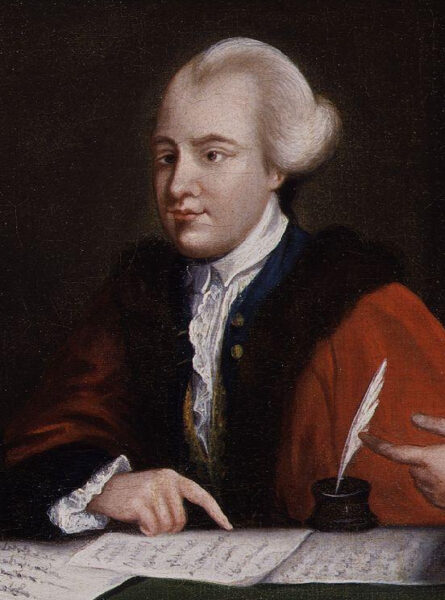
John Wilkes (1725-1797)
Cropped from a larger painting entitled “John Glynn, John Wilkes and John Horne Tooke” in the National Portrait Gallery via Wikimedia Commons.
In the long history of memorably scintillating exchanges between British parliamentarians, one ranks as my personal favorite. Though attribution is sometimes disputed, it seems most likely that the principals were John Montagu, 4th Earl of Sandwich, and the member from Middlesex, John Wilkes.
Montagu: Sir, I do not know whether you will die on the gallows or of the pox.
Wilkes: That depends, my lord, on whether I embrace your lordship’s principles or your mistress.
Repartee doesn’t get much better than that. And it certainly fits the style and reputation of Wilkes. Once when a constituent told him he would rather vote for the devil, Wilkes famously responded, “Naturally. And if your friend decides against standing, can I count on your vote?”
Wilkes deserves applause for his rapier wit, but also for something much more important: challenging the arrogance of power. He was known in his day as a “radical” on the matter. Today, we might label him “libertarian” in principles and policy and perhaps even “libertine” in personal habits (he was a notorious womanizer). His pugnacious quarrels with a King and a Prime Minister are my focus in this essay.
Born in London in 1725, Wilkes in his adult life was cursed with bad looks. Widely known as “the ugliest man in England”, he countered his unattractive countenance with eloquence, humor, and an eagerness to assault the powers-that-be with truth as he saw it. Fortunately, the voters in Middlesex appreciated his boldness more than his appearance. He charmed his way into election to the House of Commons as a devotee of William Pitt the Elder and, like Pitt, became a vociferous opponent of King George III’s war against the American colonies.
Pitt’s successor as PM in 1762, Lord Bute of Scotland, earned the wrath of Wilkes for the whole of his brief premiership. Bute negotiated the treaty that ended the Seven Years War (known in America as the French & Indian War), which Wilkes thought gave too many concessions to the French. Wilkes also opposed Bute’s plan to tax the Americans to pay for the war.
[…]
George III took it personally. He ordered the arrest of Wilkes and dozens of his followers on charges of seditious libel. For most of the nearly thousand years of British monarchy, kings would have remanded foes like Wilkes to the gallows forthwith. But as a measure of the steady progress of British liberty (from Magna Carta in 1215 through the English Bill of Rights in 1689), the case went to the courts.
Wilkes argued that as a member of Parliament, he was exempt from libel charges against the monarch. The Lord Chief Justice agreed. Wilkes was released and took his seat again in the House of Commons. He resumed his attacks on the government, Bute’s successor George Grenville in particular.
Jeremy Clarkson and “the swamp of arrogant prejudice and self-gratification which sits at the bottom of the brain”
Nicholas Harris recounts the story of Jeremy Clarkson’s steady rise and sudden recent fall after a crude reference to someone or other in a newspaper article:
“Ask Clarkson. Clarkson knows — people like fast cars, they like females with big boobies, and they don’t want the Euro, and that’s all there is to it.” This surmise, from Peep Show, captures the essence of Jeremy Clarkson’s Noughties appeal — approvingly for those who liked him, and scandalously for those who didn’t. The spawn and spokesman of the English male id. Insular, impudent and straightforward in taste. And if that weren’t enough, he was also into cigs, engines and the Second World War.
For the minority of a more severe, moralistic, and joyless disposition, this made him a national-psychological defect to be suppressed, or ideally exposed and exorcised. Before Piers Morgan, Nigel Farage or Donald Trump provided such stern competition, it was a small badge of honour on the Left to publicly hate Clarkson. But for many of us (probably a majority at his peak) he was a vulgar treat to indulge. For the length of a Sunday column or an episode of Top Gear, we could wallow harmlessly in the swamp of arrogant prejudice and self-gratification which sits at the bottom of the brain. At a time of minimal collective loyalty, the nation could reliably divide into those two tribes. Clarkson the monster, or Clarkson the geezer. Wokery vs blokery. A version of the same split is fuelling the current Clarkson row, but with the weight of opinion reversed.
[…]
But his spiritual and popular appointment to the English is a far tougher thing to dismiss. He is, like it or not, quite a lot of us writ ludicrously, satirically large. Like a 21st-century John Bull: to paraphrase Auden, a self-confident, swaggering bully of meaty neck and clumsy jest. Whatever Clarkson’s professional fate, the question of whether our society can tolerate him has implications for the stomach and sensibility of the national character, of which he is a significant avatar and champion. And his rise and fall reads as a history of a changing English firmament, one in which public morality has come to supersede mere entertainment.
Plenty of time and work went into the germination of such a figure. Clarkson’s early life is a whistle-stop tour of the English class system. He was born rural, lower-middle class, Yorkshire. But, in a wonderful twist of fate, the Clarkson family came into money after his parents won the exclusive rights to sell Paddington Bear dolls, based on the ones they had made for him and his sister. With aspirational intent, Clarkson was sent to Repton, one of the North’s oldest private schools. There, he smoked, pranked and failed his way to expulsion, developing the likeable loutishness which is his career mainstay. And then he jumped social tracks again, entering the lowest rungs of the Fourth Estate at the Rotherham Advertiser.
A public schoolboy who can still boast that he crashed out of education with a C and two Us at A Level. The ingredients were in place for a broad, classless appeal. But Clarkson really came of professional age in the new meritocracy of Thatcher and Murdoch, a place where common touch came to supersede common background (something also exploited by Boris Johnson and Nigel Farage). It was an England of quick, coarse wit, and quicker, coarser money; of the triumphant red-top, and the unrepentant “lad”. It suited Clarkson perfectly. Flush with entrepreneurial spirit, in Eighties London he had the wheeze of syndicating car news and reviews from his own company to the regional press. It was a money-maker which introduced him to motoring journalism and eventually to the producers of Top Gear.

